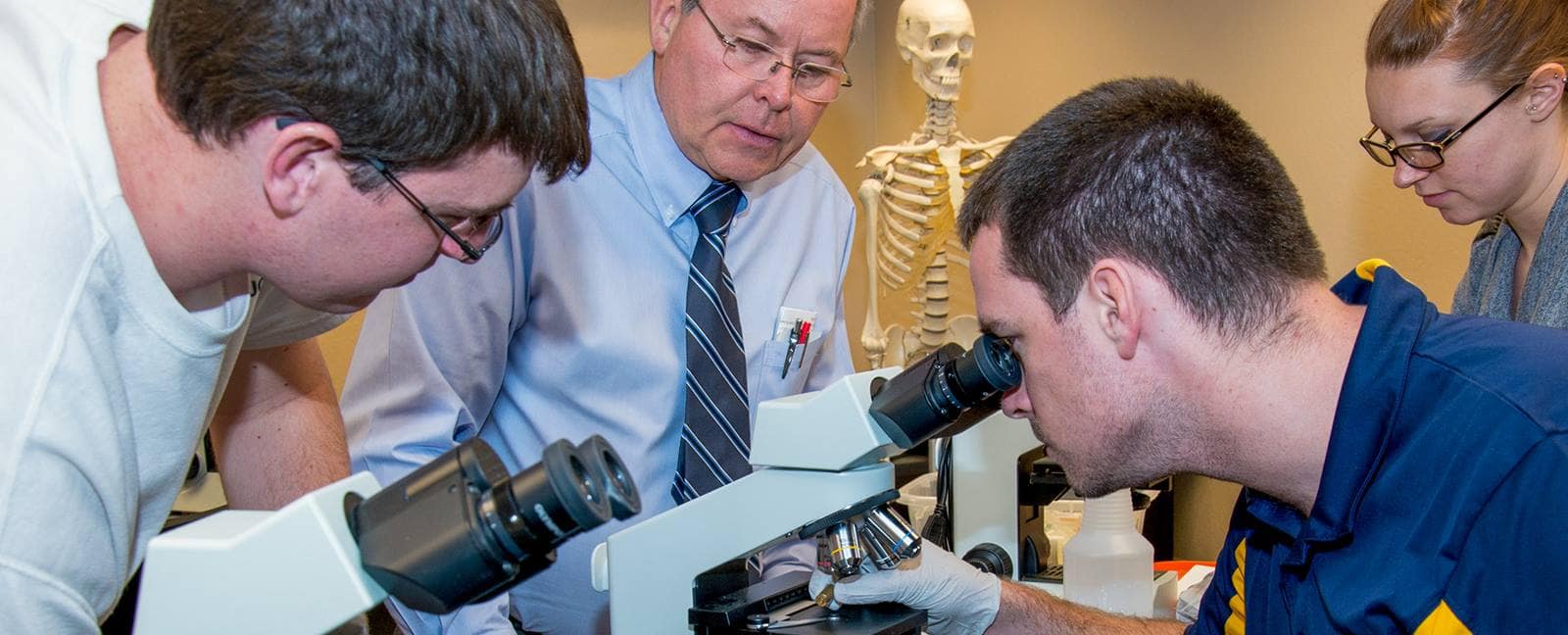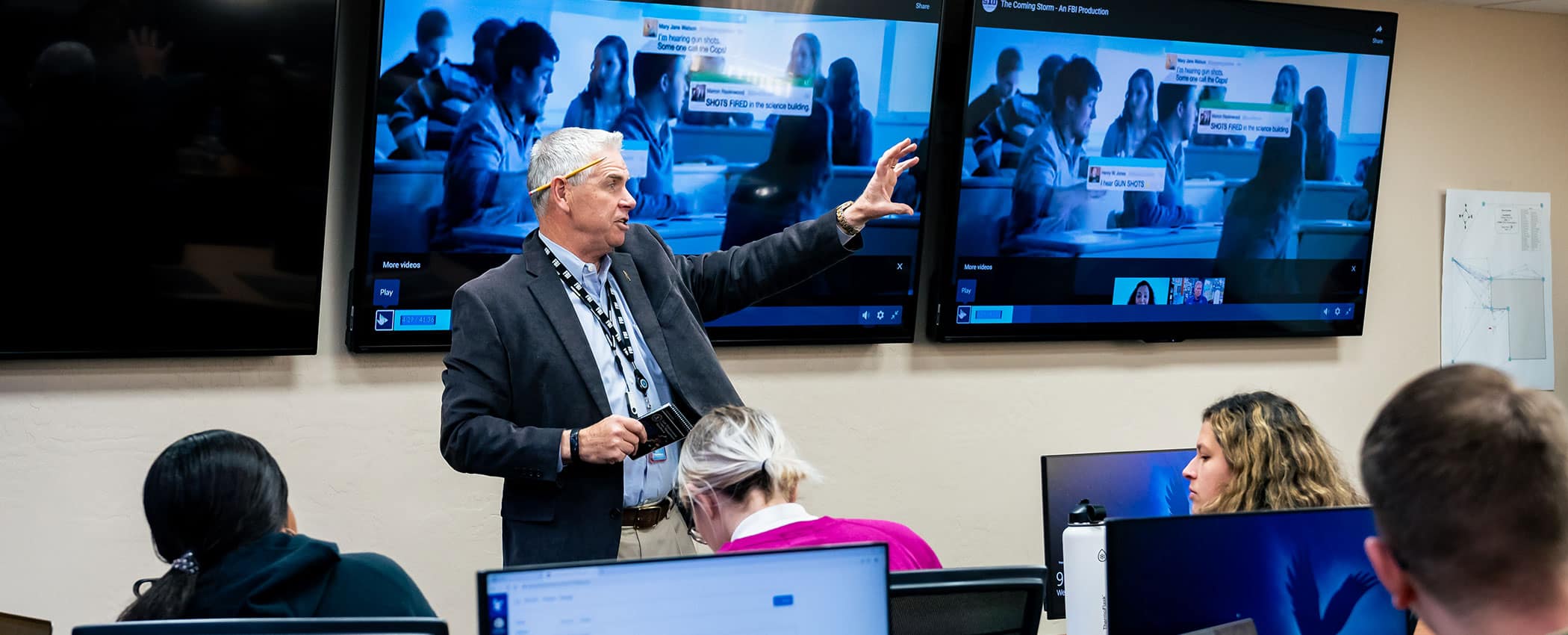
Bachelor of Science in
Forensic Biology
Working in four new laboratories with professional equipment alongside faculty, students get the knowledge and skills needed for careers in the growing forensics field.
Embry-Riddle Aeronautical University’s Bachelor of Science degree in Forensic Biology provides students with a foundation in biology, chemistry, and law with the necessary course work to become a certified molecular biologist or chemist by the American Board of Criminalistics (ABC) through examination upon graduation. Students will also accrue all of the prerequisite courses to continue into medical, dental, graduate, or law school, should they choose one of those paths.
The accompanying laboratory components within all of the biology and chemistry classes will offer ample hands-on experiences with techniques and equipment. In the Forensic Crime Scene Investigation Lab and the Forensic Biology Lab, students participate in evidence collection, crime scene investigation, tissue sampling and analysis, and DNA and biological specimen analysis techniques.
Led by faculty from science, law enforcement and judicial backgrounds, the program provides the necessary breadth and expertise to students’ studies. Students enrolled in this program will be part of a team of experts that has had and will continue to have an impact in forensic science.
Students have the chance to join Lambda Alpha Epsilon (ACJA-LAE), the ERAU chapter of the American Criminal Justice Association, as well as the American Academy of Forensic Sciences (AAFS). Students can also opt to participate in annual national and regional competitions in crime scene investigation, firearms, physical agility, and academics, in addition to participating in undergraduate research projects with various faculty mentors.
The U.S. Bureau of Labor and Statistics has predicted that employment opportunities for forensic science professionals will grow 17 percent from 2016 through 2026, much faster than the average for all occupations. Graduates of the Forensic Biology program often find jobs in local and state crime labs, private forensic labs, medical examiners’ offices, offices of prosecutors and defenders, the FBI, or even the Armed Forces DNA Identification Lab, to name a few in the forensic branches. Students can also find gainful employment in medical research, biotechnology companies, hospitals, and pharmaceutical companies.
DETAILS
About Forensic Biology at the Prescott, AZ Campus
At ERAU’s Prescott Campus, the B.S. in Forensic Biology degree program, housed within the Department of Biology and Chemistry in the College of Arts and Sciences, combines the disciplines of biology, chemistry, and law to give students the skills and background needed by professionals in forensic science laboratories, law enforcement, and related fields.
Students will get the opportunity to work in four brand new laboratories with professional equipment and experts in the field, which will give graduates the knowledge and technical skills needed to confront issues in forensics that affect evidence acceptance and validation, as well as ethical dilemmas.
Students who have interests in analyzing evidence found at a crime scene, the justice system, medicine, and working in the outdoors should explore this growing, rewarding, and promising career field.
Core curriculum and program requirements in Forensic Biology are designed to give students fundamental science knowledge and demonstrate the ways in which biology, chemistry, and law integrate with aspects of their future careers.
Undergraduate research with faculty in specialized subject areas is a valuable way to increase knowledge through hands-on experience.
Travel to the annual national AAFS conference with faculty is highly encouraged and a great opportunity to network by meeting people in the field, which can lead to internship and job offers.
Study abroad opportunities include visiting internationally recognized forensics labs and tours of infamous crime scenes.
Get access to state-of-the-art labs and fieldwork opportunities locally from the Yavapai County Sheriff’s Office. ERAU students have the chance to intern with that office’s Volunteers In Protection (VIP) program, assisting in criminal investigations, working with the forensics unit, cold case unit, and much more.
Prescott’s small campus atmosphere creates an ideal learning environment in which students interact closely with faculty, enhancing their educational experience.
Required internship or co-op gaining valuable hands-on experience in the student’s career of choice, in addition to valuable networking.
Student Learning Outcomes
Students will:
- Apply scientific methods to analyze forensic evidence.
- Implement laboratory skills to analyze forensic evidence.
- Achieve functional scientific communication skills.
- Apply knowledge in investigating crime scenes, collecting, and preserving forensic evidence.
- Assess the ethical and legal responsibilities of forensic analysts.
- Present forensic analyses of evidence in court as scientific experts.
Program Requirements
General Education
Embry-Riddle degree programs require students to complete a minimum of 36 hours of General Education coursework. For a full description of Embry-Riddle General Education guidelines, please see the General Education section of this catalog.
Students may choose other classes outside of their requirements, but doing so can result in the student having to complete more than the degree's 120 credit hours. This will result in additional time and cost to the student.
| Communication Theory and Skills | 9 | |
| Computer Science/Information Technology | 3 | |
| Mathematics | 6 | |
| Physical and Life Sciences (Natural Sciences) | 6 | |
| Humanities and Social Sciences | 12 | |
3 hours of Lower-Level Humanities | ||
3 hours of Lower-Level Social Science | ||
3 hours of Lower-Level or Upper-Level Humanities or Social Science | ||
3 hours of Upper-Level Humanities or Social Science | ||
| Total Credits | 36 | |
Forensic Biology Core (91 Credits)
The following course of study outlines the quickest and most cost-efficient route for students to earn their B.S. in Forensic Biology. Students are encouraged to follow the course of study to ensure they complete all program required courses and their prerequisites within four years.
Courses in the core with a # will satisfy your general education requirements.
| BIO 120 & 120L | Foundations of Biology I and Foundations of Biology I Laboratory # | 4 |
| BIO 121 & 121L | Foundations of Biology II and Foundations of Biology II Lab | 4 |
| BIO 215 & 215L | Genetics and Genetics Laboratory | 4 |
| BIO 216 & 216L | Microbiology and Microbiology Laboratory | 4 |
| BIO 302 & 302L | Instrumental Analysis and Trace Evidence and Instrumental Analysis and Trace Evidence Lab | 4 |
| BIO 304 | Critical Reading and Scientific Communication | 1 |
| or CHM 304 | Critical Reading and Scientific Communication | |
| BIO 304 | Critical Reading and Scientific Communication | 1 |
| or CHM 304 | Critical Reading and Scientific Communication | |
| BIO 304 | Critical Reading and Scientific Communication | 1 |
| or CHM 304 | Critical Reading and Scientific Communication | |
| BIO 305 & 305L | Human Anatomy and Physiology I and Human Anatomy and Physiology Laboratory | 4 |
| BIO 405 & 405L | Molecular and Cell Biology and Molecular and Cell Biology Laboratory | 4 |
| BIO 406 & 406L | Forensic DNA Analysis and Forensic DNA Analysis Laboratory | 4 |
| CHM 110 & 110L | General Chemistry I and General Chemistry I Laboratory # | 4 |
| CHM 111 & 111L | General Chemistry II and General Chemistry II Laboratory | 4 |
| CHM 210 & 210L | Organic Chemistry I and Organic Chemistry I Laboratory | 4 |
| CHM 211 & 211L | Organic Chemistry II and Organic Chemistry II Laboratory | 4 |
| CHM 310 & 310L | Biochemistry and Biochemistry Laboratory | 4 |
| COM 122 | English Composition # | 3 |
| General Education - Communications Elective # | 6 | |
| General Education - Computer Science/Information Technology Elective # | 3 | |
| General Education - Humanities Lower-Level # | 3 | |
| General Education - Social Science Lower-Level Elective # | 3 | |
| HU 330 | Values and Ethics # | 3 |
| MA 222 | Business Statistics # | 3 |
| MA 241 | Calculus and Analytical Geometry I # | 4 |
| PS 113 & 113L | Introductory Physics I and Introductory Physics I Laboratory # | 4 |
| PS 117 & 117L | Introductory Physics II and Introductory Physics II Lab # | 4 |
| Total Credits | 91 | |
Designated Electives (Choose 6-8 credits)
| Upper level courses in BIO/CHM applicable to Forensic Science | ||
Co-op/Internship/Capstone/Research (3 Credits)
| CEFB 396 | COOP Ed - Forensics Biology | 3 |
| BIO 310 | Research (Can be repeated up to six times) | 1 |
| BIO 490 | Senior Seminar | 3 |
| PSY 496 | Capstone in Psychology | 3 |
Security Intelligence Studies/Social Science Core (13 Credits)
| SIS 200 | Introduction to the U.S. Legal System | 3 |
| SIS 220 | Investigative Methodology and Forensic Science | 4 |
| SIS 308 | Courts and Criminal Justice | 3 |
| SIS 411 | Procedural Laws and Evidence | 3 |
Open Electives (5-7 Credits, 3 credits must be upper-level)
| Open Electives (3 Credits must be upper-level) | 5-7 | |
| Total Credits | 120 | |
- #
General Education Courses
All Army ROTC students are required to complete SS 321 - U.S. Military History 1900-Present (3 credits) in order to commission.
Suggested Plan of Study
| Freshman Year | ||
|---|---|---|
| Fall | Credits | |
| BIO 120 & 120L |
Foundations of Biology I | 4 |
| CHM 110 & 110L |
General Chemistry I | 4 |
| COM 122 | English Composition | 3 |
| MA 241 | Calculus and Analytical Geometry I | 4 |
| UNIV 101 | College Success | (1) |
| Credits Subtotal | 15.0 | |
| Spring | ||
| BIO 121 & 121L |
Foundations of Biology II | 4 |
| CHM 111 & 111L |
General Chemistry II | 4 |
| Humanities Lower-Level Elective | 3 | |
| Social Science Lower-Level Elective | 3 | |
| Credits Subtotal | 14.0 | |
| Sophomore Year | ||
| Fall | ||
| BIO 215 & 215L |
Genetics | 4 |
| CHM 210 & 210L |
Organic Chemistry I | 4 |
| Communications Elective | 3 | |
| SIS 200 | Introduction to the U.S. Legal System | 3 |
| Credits Subtotal | 14.0 | |
| Spring | ||
| BIO 216 & 216L |
Microbiology | 4 |
| BIO 304 | Critical Reading and Scientific Communication | 1 |
or CHM 304
|
Critical Reading and Scientific Communication | |
| CHM 211 & 211L |
Organic Chemistry II | 4 |
| SIS 220 | Investigative Methodology and Forensic Science | 4 |
| Credits Subtotal | 13.0 | |
| Junior Year | ||
| Fall | ||
| BIO 302 & 302L |
Instrumental Analysis and Trace Evidence | 4 |
| BIO 305 & 305L |
Human Anatomy and Physiology I | 4 |
| Computer Science / Information Technology Elective | 3 | |
| PS 113 & 113L |
Introductory Physics I | 4 |
| Credits Subtotal | 15.0 | |
| Spring | ||
| BIO 304 | Critical Reading and Scientific Communication | 1 |
or CHM 304
|
Critical Reading and Scientific Communication | |
| CHM 310 & 310L |
Biochemistry | 4 |
| Communications Elective | 3 | |
| MA 222 | Business Statistics | 3 |
| PS 117 & 117L |
Introductory Physics II | 4 |
| Credits Subtotal | 15.0 | |
| Summer | ||
| BIO 490 | Senior Seminar * | 3 |
| Credits Subtotal | 3.0 | |
| Senior Year | ||
| Fall | ||
| BIO 405 & 405L |
Molecular and Cell Biology | 4 |
| Designated Elective - Upper Level | 3 | |
| SIS 308 | Courts and Criminal Justice | 3 |
| Open Elective | 4 | |
| Credits Subtotal | 14.0 | |
| Spring | ||
| BIO 304 | Critical Reading and Scientific Communication | 1 |
or CHM 304
|
Critical Reading and Scientific Communication | |
| BIO 406 & 406L |
Forensic DNA Analysis | 4 |
| Designated Elective - Upper Level | 3 | |
| HU 330 | Values and Ethics | 3 |
| Upper Level Open Elective | 3 | |
| SIS 411 | Procedural Laws and Evidence | 3 |
| Credits Subtotal | 17.0 | |
| Credits Total: | 120.0 | |
- *
Students can choose from the following options:
CEFB 396 Internship/Co-Op
BIO 490 Senior Seminar
BIO 310 Research (Can be repeated up to six times)
PSY 496 Capstone in Psychology
Get Started Now:
Summary
123 Credits
Estimate your tuition by using the Tuition Calculator
View Financial Aid Information
Learn about our General Education
Find out about transferring credits to this degree
Learn more about our Veterans & Military benefits
View our Academic Calendar











